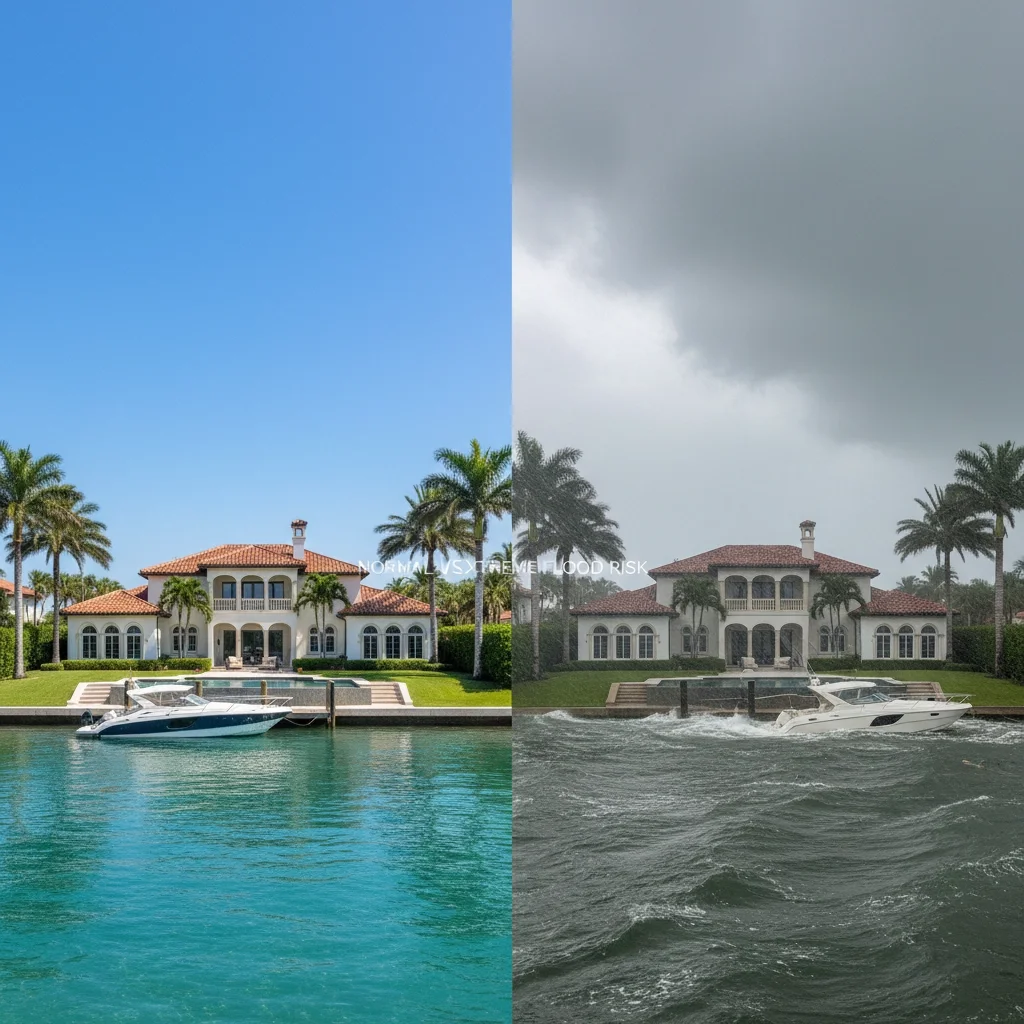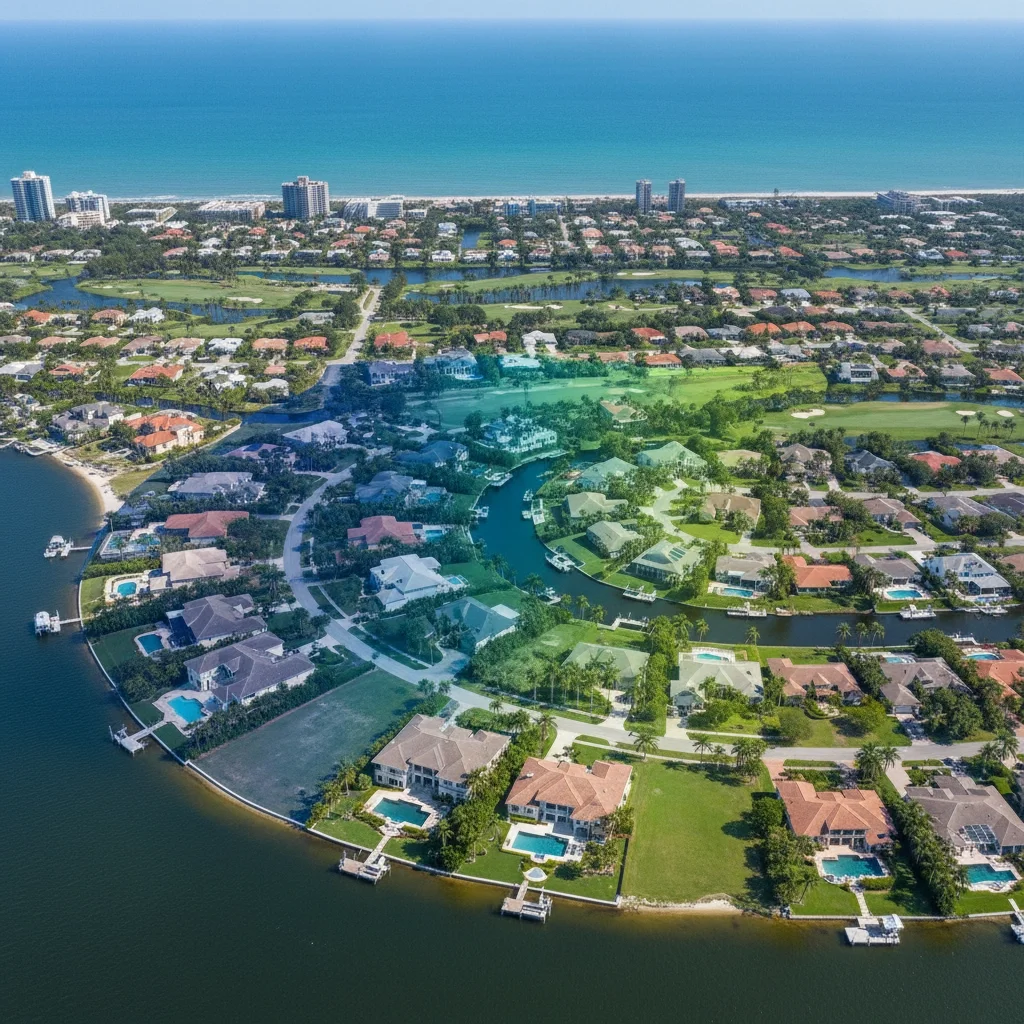Naples Flood Zones Explained: 7 Mistakes You're Making with FEMA's 2025 Map Updates (And How to Fix Them)
Understanding Naples Flood Zone Basics
Before diving into common mistakes, let's clarify what FEMA flood zones actually mean. Zone X represents minimal to moderate flood hazard areas with less than a 0.2% annual chance of flooding: where flood insurance isn't federally required. Zone AE represents high-risk areas with a 1% annual chance of flooding (the "100-year floodplain") where flood insurance is mandatory for mortgaged properties. Zone VE represents very high-risk coastal areas exposed to wave action and storm surge, typically found in waterfront neighborhoods like Port Royal and Aqualane Shores.
Now, let's tackle the mistakes that trip up even experienced Southwest Florida residents.
Mistake #1: Assuming Zone X Properties Don't Need Flood Insurance
This is probably the most dangerous assumption homeowners make. Many people in Zone X areas believe they're completely protected from flood risk and skip insurance entirely. But "minimal flood hazard" doesn't mean zero risk.
Here's what Zone X actually means: your property has less than a 0.2% annual chance of flooding based on historical data and current conditions. However, development changes can dramatically increase runoff, and FEMA maps can take five to seven years to reflect these changes.
How to Fix This: Even in Zone X, consider purchasing flood insurance. It's significantly cheaper in low-risk zones: often under $400 annually: and provides crucial protection against the unexpected. Remember, standard homeowner's insurance doesn't cover flood damage, regardless of your zone designation.
Mistake #2: Trusting That FEMA Maps Are Always Current and Accurate
One of the biggest misconceptions is that FEMA flood maps accurately reflect current flood risk. In reality, the typical cycle for a flood map update takes five to seven years, and maps often reflect data that's outdated by the time they're published.
As Southwest Florida continues developing, converting agricultural or forested areas into buildings and roads, runoff patterns shift dramatically. What was safe five years ago might not be safe today.
How to Fix This: Check the "Effective Date" on your Flood Insurance Rate Map (FIRM) panel and look for the "Date Analyses Completed" to understand how current your data actually is. Use FEMA's Flood Map Service Center at msc.fema.gov to access the most recent available information for your specific address. Don't rely on outdated information when making major financial decisions.
Mistake #3: Overlooking Your Property's Elevation Relative to Base Flood Elevation (BFE)
Many buyers focus solely on their flood zone designation without understanding that what truly impacts your property value, insurance rates, and safety is your property's elevation relative to FEMA's Base Flood Elevation.
Zone AE areas include specific elevations like AE7, AE9, or AE11, which specify the exact BFE in feet above sea level. In the City of Naples, finish floor elevation should be 10 feet or higher. A home elevated three feet above the BFE will have dramatically lower insurance costs than one at the BFE level.
How to Fix This: Request an Elevation Certificate from a licensed surveyor to determine your exact elevation relative to the BFE. This certificate is essential for accurately assessing flood risk and can significantly reduce insurance premiums if your home is elevated above the BFE. Don't guess: get the precise measurements.
Mistake #4: Not Accounting for Naples Reserve's Specific Map Updates
In February 2024, FEMA issued revised panels for areas including Naples Reserve, initially moving properties from Zone X to Zone AE. However, many homeowners missed that FEMA re-validated previously issued Letters of Map Revision-Based on Fill (LOMR-F) on February 9, 2024, which retained most Naples Reserve homes in Zone X.
This created significant confusion about which properties were actually affected by the changes.
How to Fix This: If you own or are considering property in Naples Reserve, check whether a LOMR-F letter was issued at closing. This letter exempts your property from Special Flood Hazard Area designation if it was elevated on fill material. Contact FEMA directly or visit their website to verify your specific property's official designation following the February 2024 updates.
Mistake #5: Ignoring That Zone Designation Doesn't Determine Property Value
Here's a surprise: some of Naples' most expensive neighborhoods: including Port Royal, Aqualane Shores, and Olde Naples: are situated within flood zones due to their proximity to the Gulf of Mexico and Naples Bay. Yet these areas maintain premium valuations.
What impacts value more significantly is elevation relative to BFE, construction standards, and mitigation measures: not just zone designation.
How to Fix This: Focus your property evaluation on specific elevation characteristics rather than zone designation alone. Properties elevated above BFE can hold strong value even in AE or VE zones. When evaluating properties, consider factors like:
Elevation above BFE
Construction materials and standards
Flood mitigation features
Historical flooding patterns
Local drainage infrastructure
Mistake #6: Not Understanding How 2025 Map Updates Affect Your Insurance
FEMA's 2025 updates include revised flood zones and base flood elevations for various Florida areas. Some areas currently considered low-risk might be reclassified as high-risk, affecting building codes, property valuations, and mortgage requirements.
In Collier County specifically, 85 new panels with updated analysis were released, potentially moving some properties into higher-risk flood zones. These changes can dramatically impact insurance costs and property requirements.
How to Fix This: Stay proactive by monitoring FEMA's website for updates affecting your area. Contact your insurance agent now to discuss potential premium changes before maps become official. If you're purchasing property, request that sellers provide current flood determinations based on the latest available FEMA data. Don't wait for surprises after closing.
Mistake #7: Not Verifying Your Specific Property Status
The most critical error is assuming that because your neighborhood is in a certain zone, your property definitely shares that designation. FEMA's general flood maps offer broad information but don't provide specific details for individual properties.
Properties that used fill material during construction may have different designations than neighboring homes. Even within the same development, elevations and classifications can vary significantly.
How to Fix This: Use the City of Naples interactive web tool at naplesgov.com to enter your specific address and view your property's designated flood zone. Cross-reference this with FEMA's Flood Map Service Center and obtain a Flood Determination Certificate for your exact property. Never assume your status based on neighborhood-level information: always verify your individual property's official designation.
Taking Action: Your Next Steps
The landscape of flood risk assessment is evolving beyond simple zone designations. Modern flood risk assessment considers ground characteristics, elevation, and first-floor height: not just zone labels.
Here's your action plan:
Get Professional Assessment: Obtain an Elevation Certificate and current flood determination for your property
Review Insurance Options: Discuss coverage with a flood insurance specialist, regardless of your current zone
Stay Updated: Monitor FEMA announcements and your local government's flood management updates
Document Everything: Maintain elevation certificates, LOMR letters, and flood determinations in your property records
Understanding Naples flood zones isn't just about compliance: it's about protecting your family and your investment in one of Southwest Florida's most desirable communities. With FEMA's 2025 updates bringing changes across the region, now's the time to get informed and take action.
For personalized guidance on navigating Naples' real estate market and understanding how flood zones affect your property decisions, contact the experts at AnchorPoint Real Estate. Our local expertise helps you make informed decisions in Southwest Florida's evolving market.


